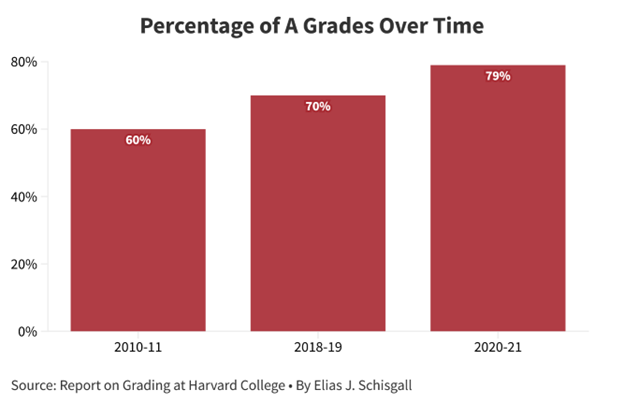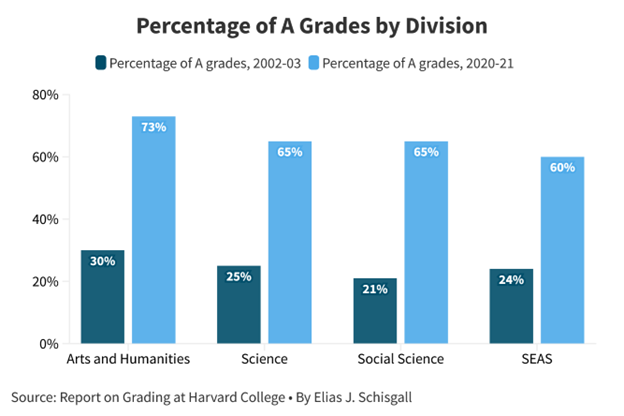Grade inflation, Harvard Edition
I sometimes write posts for this blog and then file them without posting, either thinking I will get back to them later and improve/shorten them, or just deciding that the post isn’t up to snuff. I have a looong one sitting in limbo right now on grade inflation, specifically in US universities. I think it’s an issue in Canadian universities (and secondary schools) also, but there is better data on it for the US.
Anyway, I may post that still-simmering article at some point, as it is a topic about which I care, but the Harvard Crimson, that august institution’s student paper, has published an article about grade inflation at Harvard that provides a nice introduction to the topic – and a shorter post.
Kurt Vonnegut is reported to have said ‘Most kids can’t afford to go to Harvard to be misinformed.’, and he wrote that long before Harvard’s most recent troubles – in 1987, in fact. It turns out that if a kid can afford it, he is at least all but assured of getting an A while being misinformed.
 or……….
or………. 
The Crimson article is from 2023, and titled ‘Harvard Report Shows 79% A-Range Grades Awarded in 2020-21, Sparking Faculty Discussion’
The Crimson has no paywall, so you can find the article and read it yourself, I expect, but here’s the graph that it opens with.

So, nearly 80% of the course grades awarded in 2020/1 were As or A minuses. Wow, is all I can say. I thought we gave marks that were too high at UWO back in the day, but I don’t think we ever approached 70+% As.
As is always the case, the percentage of As awarded varies by discipline. Here’s another graph from the Crimson report, which also goes further back into Harvard history.

SEAS is the School of Engineering and Applied Science, and I have to admit that I am surprised that Social Science profs were just as tough graders as were those in Science. (Economists, almost always housed in Social Science, are typically tough graders, but this is normally more than made up for by the Sociologists, Psychologists, Political Scientists, etc. Not at Harvard, apparently.) That the A & H faculty were the easiest graders should surprise no one. They would almost certainly look tough compared to the faculty in the Faculty of Education – if Harvard has one. And, of course, I am using ‘tough’ here ironically. The 60% A marks handed out in SEAS is anything but ‘tough’.
Yet the truly remarkable thing here is that the percentage of A grades awarded has more than doubled in 20 years in all faculties.
Now why do you think that happened?
I can tell you that there were administrators at Western in my day who attributed the ever-rising admission average to get into the Faculty of Social Science to the fact that ‘Western is just attracting better and better students.’ Secondary School grade inflation? – oh, no, certainly not.
The Crimson has some quotes from various administrators at Harvard about this, one of them from Dean of Undergraduate Education Amanda Claybaugh:
In the meeting, Claybaugh said that the “report establishes we have a problem — or rather, we have two: the intertwined problems of grade inflation and compression.”
By ‘grade compression’ academics mean the fact that all grades awarded are concentrated on a few possibilities, making it hard to distinguish really outstanding students from others. I find it encouraging – remarkable, even, given my own interactions with administrators – that the Dean thinks this is a problem. She is later quoted again:
“There is a sense that giving a wider range of grades would give students better information about their performance, and it would give us better information about where they are ranked against other students,” Claybaugh said in an interview after the meeting.
Claybaugh said that the evidence for the existence of grade inflation was less clear, as many student grades are well-deserved and faculty have increasingly focused on learning objectives.
Yea, that sounds more like an administrator – these grades are well-deserved. At least, ‘many’ of them are.
The next quote actually makes me grumpy. Well, grumpier…..
Nonetheless, she said it seems, as one faculty member put it, external “market forces” are influencing grading, particularly as faculty rely on positive course evaluations from students for professional advancement, she said in the interview.
Ok, I’m an economist, I am used to the fact that everyone wants to blame those awful ‘market forces’ when things go bad, but c’mon, unnamed faculty member. If faculty are giving high marks to get higher student evaluations there is nothing ‘market’ about that, it is an internal Harvard decision to use those (almost entirely uninformative, imho) student evaluations for ‘professional advancement’. You could stop doing that, you know. I’m talking to you, Harvard.
Here’ my favourite quote:
Claybaugh said she would defer to the full faculty to decide whether or not to implement concrete reforms to Harvard’s grading policies, but said she would be “interested in exploring” changes “that put more information on the transcript that put the grade in context.”
The Crimson then mentions some of the things that ‘the full faculty’ considered in their meeting. Someone from A&H (natch) suggested grading simply be abolished, but in the end nothing was decided. Shocking. A faculty meeting in which nothing was decided.
Here’s a fact, from my time in the trenches, that is never mentioned in the article. Giving grades that use the entire grading range, from F to A at Harvard, from 0 to 100 at Western, is hard. It is hard for faculty to give students low marks, partly because they will come to your office and bitch and moan and plead, and their parents may call you (yes, they do) and plead on their behalf, but also because it is not fun. It is not pleasant. Few faculty are sadists, few want to be known as The Grim Reaper of Harvard – or Western.
But the thing is, it is part of the job. That is, it is part of the job to give accurate information to students about their learning, and giving almost everyone an A is not doing that. It is also part of the job to inform the world outside academia how good a student is. Giving almost everyone an A is not doing that, either.
This is, if you ask me – and I know you didn’t, but it’s my damn blog – the fundamental reason why over the last twenty years marks in secondary and post-secondary institutions all over North America have gone up and up and up. Instructors (most of them) don’t want to do that part of their job. And, since they don’t have to, they don’t. Giving lots of As is waaaaay easier on everyone, so that is what happens.
It is the ultimate slogan of the 21st century. ‘Easy is best.’
Ben
Good one